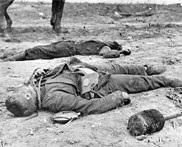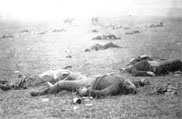God Hates Division
Next Part Israel: Sometimes God’s “Executioner of the State”
Back to By David C. Pack
God hates division and discord between people. He wants them to live together in unity and harmony. Fighting and war would bring division directly into His Church. But how?
Psalm 133:1 states, “Behold, how good and how pleasant it is for brethren to dwell together in unity!” It is wonderful when people get along—when they agree. Read Romans 16:17 and Proverbs 6:19. God says He hates “[him] that sows discord among brethren.”
Paul asked, “Is Christ divided?” The obvious answer is no! Christ is NOT divided and neither is His Church (I Cor. 1:10,13). We have seen that Christ also said, “Every kingdom divided against itself is brought to desolation; and every city or house divided against itself shall not stand: And if Satan cast out Satan, he is divided against himself; how shall then his kingdom stand?” (Matt. 12:25-26). It is interesting that even the devil has figured this out! He leads a vast kingdom of fallen spirits and recognizes that he cannot let it become divided.
War always divides those who engage in it. Division would be introduced into God’s Church the moment fighting and war were practiced by its members. Amos 3:3 asks, “Can two walk together except they be agreed?” Whether division is between people or nations, the painful answer is always NO! And war always involves intense disagreement!
What if Christians from two different countries, fighting for two different purposes, participated in the same war? Brothers in Christ would be fighting each other in a kind of civil war. This is exactly what happened to many physical brothers who fought each other in the American Civil War of the 1860s.
War always breeds more division and hatred between individuals or nations. It would do the same to the Church of God if its members participated in it.
Contents
By Their Fruits
In Matthew 7:16, Christ stated, “You shall know them by their fruits.” He repeated in verse 20, “Wherefore by their fruits you shall know them.” Matthew 12:33 says, “...for the tree is known by his [its] fruit.” These verses are primarily speaking about leaders, but they apply to almost any individual or organization. God’s servants are told to examine the “fruits”—the BY-PRODUCTS!—of any given matter, system or person.
What about war?
The first paragraph of this booklet listed the fruits of war as terror, destruction, economic upheaval, orphaned children, population displacement, widespread devastation of the land, atrocities, hunger, disease, untold suffering, misery, despair, injuries, death and even genocide—in other words, CHAOS! This is because war is inspired and influenced by the god of this world and his wicked spirits in high places (Eph. 6:12). These fallen spirits sit at the real throttle of power behind the visible governments of nations.
The conclusion: War, as a means of addressing problems, has never worked, and its fruits are always disastrous.
Warfare, But Not After the Flesh
Study the entire New Testament. You will not find a single instance where God’s people participated in men’s wars. We have seen that James 4:1-4 refers to and condemns those who were drifting into “wars and fighting.” However, there are many verses that indicate Christians are called to SPIRITUAL BATTLE—SPIRITUAL war—in their Christian struggle (I Tim. 6:12; Eph. 6:12-17). To overcome sin, they must battle the flesh, the pulls of the world and Satan.
Paul told Timothy to “war a good warfare” (I Tim. 1:18), and later explained, “You therefore endure hardness, as a good soldier of Jesus Christ. No man that wars entangles himself with the affairs of this life; that he may please Him who has chosen him to be a soldier” (II Tim. 2:3-4).
Truly, Christians are soldiers, but in a spiritual war. This does not include involvement in the carnal wars of nations. Paul wrote, “For though we walk in the flesh, we do not war after the flesh: (For the weapons of our warfare are not carnal [physical])” (II Cor. 10:3-4). So, all God’s servants are soldiers, but they fight on a spiritual level.
“But Ancient Israel Went to War…”
Many have sought to justify war by citing the Old Testament wars of ancient Israel. Those who ignore the facts of scripture suppose that their fighting and warring represent God’s will—or at least His license—for modern nations today. We will see that this is simply not true. It was never God’s intention that Israel defend itself from its enemies.

Faith and Obedience Short-lived
Their obedience, however, never lasted very long. All through the period of the judges, Israel was “on again, off again” in their submission to God. Each time they rebelled and forsook Him to serve the gods of the nations around them, God sent them into captivity.

After a period of time, Israel would cry out for deliverance and promise to do better. God would send a judge (Jdg. 2:16-18) to deliver them, and they would remain on track for a short while. As soon as the judge died (Othniel, Ehud, Deborah, Gideon, Tola, Jephthah, Samson, etc.), the pattern would repeat itself.
This continued for hundreds of years, until the time of Samuel. Eventually, the country had become so corrupt and immoral that the book of Judges ends with “In those days there was no king in Israel: every man did that which was right in his own eyes” (Jdg. 21:25).
As Samuel’s life drew to a close, his sons having departed from worshipping God, the leaders of Israel approached him with a demand: “Then all the elders of Israel gathered themselves together, and came to Samuel unto Ramah, and said unto him, ‘Behold, you are old, and your sons walk not in your ways: now make us a king to judge us like all the nations’…And the LORD said unto Samuel, ‘Hearken unto the voice of the people in all that they say unto you: for they have not rejected you, but they have REJECTED ME, that I should not reign over them’” (I Sam. 8:4-7).
Israel wanted to “be like everybody else.” They refused God’s rule and form of government and, in so doing, directly rejected God. The rest of mankind had rejected God’s government long before Israel, and has continued rejecting it ever since. Now, with their own king, Israel could better “fit in.” As you can see, peer pressure did not begin in the modern age.
Israel continually lacked the faith to believe that God would keep His promise. They wavered constantly and began to establish their own standing army. Even as they departed from Egypt, with Pharaoh’s army in hot pursuit, God told them through Moses, “Fear you not, stand still and see the salvation of the Eternal, which He will show to you today…the Eternal shall fight for you, and you shall hold your peace” (Ex. 14:13-14).
Of course, the Red Sea parted and God swallowed Pharaoh’s army with no need for help from Israel. Even the Egyptians said, “Let us flee from the face of Israel; for the LORD fights for them” (Ex. 14:25). Ex 14:27 and 31 explain that “the LORD overthrew the Egyptians.”
It was always God’s intention that Israel “stand still…holding their peace,” and watch Him fight and win their battles!
Deuteronomy 1:1-46 is a long account of Israel’s continual faithlessness and rebellion in the face of God’s willingness to fight for them. (See Deut 1:30.)



